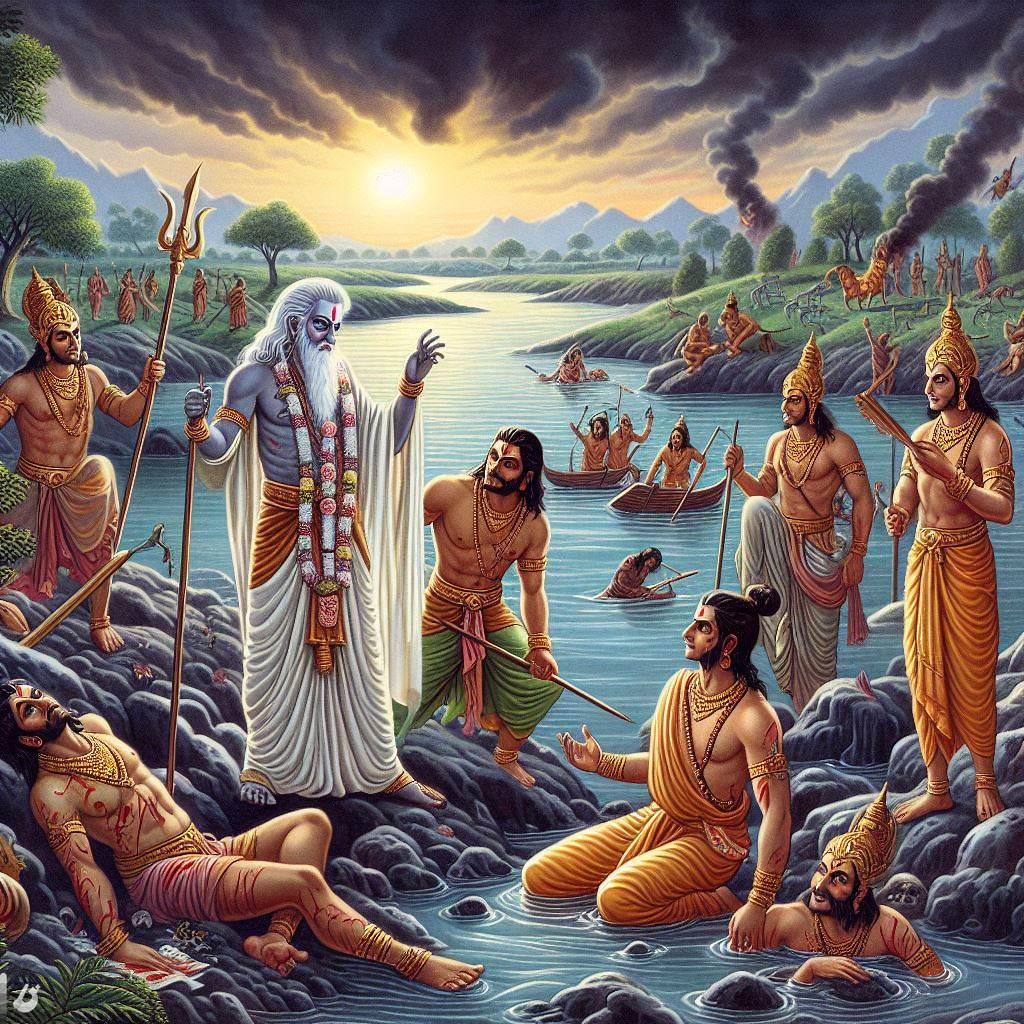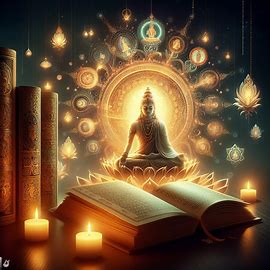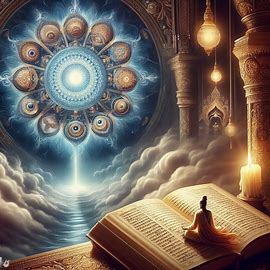The Divine Test of Yudhishtira: Wisdom,
Justice, and the Restoration of Life
In the epic tales of Mahabharata, the legendary Pandava brothers—Yudhishtira, Bhima, Arjuna, Nakula, and Sahadeva—stand as paragons of virtue and resilience. One fateful day, amidst their sojourn in the wilderness, a profound test of wisdom and justice awaited them.
Seeking respite
from the relentless heat and an unquenchable thirst, the brothers encountered a
mysterious voice near a secluded pool. Nakula, tasked with fetching water,
faced an ethereal challenge—answer questions before drinking. Driven by thirst,
Nakula imbibed the water and fell lifeless.
The
heart-wrenching sight prompted Yudhishtira, the eldest, to investigate.
Confronted by the unseen interlocutor, he, too, faced a barrage of existential
queries.
He felt a great
pity for them. "Why should I live without my brothers?" he thought.
The same voice
now said to him;" Your brothers died because they would not listen to my
advice. Answer my questions first and then you may drink and live."
He replied,
"Ask your questions, please".
"How does a
man become wise?" asked the voice.
"Not by
studying books," said Udhishtira, "a man gets wisdom only in the
company of the wise and the good."
"What goes
faster than the wind?" asked the voice.
"Mind
travels faster than the wind?"
Pandava prince.
" Who is the
true friend of a traveler?" the voice now asked.
"Learning is
his best friend," was the reply.
"What
follows a man after death?"
"His
dharma," said the wise son of Pandu.
"What is
happiness?" asked the voice.
" It is the
fruit of right conduct,' said Youdhistira.
"If you give
up something, you are loved by all. What is that?"
asked the voice.
"Pride,"
replied Yudhishtira.
"If you
sacrifice a certain thing, ,it makes you rich, What is that?'
"Desire".
"Who is a
real Brahmin?"
"Birth and
learning do not make a true Brahmin," answered Ydhishtira, "It is
right conduct that makes one so",
"What is the
greatest wonder in the world?" was the last question.
"Men see
people dying every day and yet desire to live forever" said Yudhishtira,
"This surely is the greatest wonder in the world."
now the voice
said,"You may wish one of your brothers to live and he will regain his
life."
He thought for a
moment and said."Let my brother Nakula live again."
The Yasksha, for
it was he that had been asking all these questions, said,"I would like to
know why you have chosen Nakula and not Bhima or Arjuna?'
"O
Yaksha", Yudhishtira said, My father married Kunti and Makdri. I am
Kunti's son and am alive and it is but just that Madri should have one of her
sons alive."
The Yaksha now
showed himself in his true from as Yama, the Lord of Dharma. He brought back to
life all the princes. Then he disappeared.
Yudhishtira's
responses unveiled profound truths: wisdom is gleaned in the company of the
wise, the mind transcends the swiftness of the wind, learning is a traveler's
true friend, and righteousness (dharma) follows a soul beyond death.
The voice delved
deeper, probing the nature of happiness and the sacrifices that lead to
enrichment. Yudhishtira's sagacious replies unraveled the essence of virtue and
the pitfalls of pride and desire.
In the
culminating question, Yudhishtira exposed the paradox of human nature—yearning
for eternal life despite witnessing daily mortality.
The unseen
examiner, revealed as Yama, the Lord of Dharma, offered a benevolent
proposition: the revival of one brother. Yudhishtira's choice, Nakula,
reflected a poignant sense of justice. He invoked the balance between Kunti and
Madri, affirming life for one son from each mother.
Yama, satisfied
with Yudhishtira's righteous decisions, manifested his true form, restoring all
the princes to life before vanishing into the cosmic realms.
This divine
ordeal showcased not only the Pandavas' wisdom but also Yudhishtira's
unwavering commitment to justice, reinforcing the enduring theme of
righteousness prevailing over adversity in the grand tapestry of the
Mahabharata.
Illuminating Wisdom: Unveiling Truth, Light,
and Immortality in Upanishadic Prayer
In the profound verses of the Brihadaranyak Upanishad (1:3:28), encapsulated in three succinct lines, a powerful spiritual journey unfolds: "Asatoma sadgamaya; Tamaso ma jyotirgamaya; Mrtyor ma amrtam gamaya" — Lead me from reality to the truth;/ Lead me from darkness to light;/ May I be led from death to immortality.
The first line delves into the concept of "Asat" or reality, encompassing everything perceived through the senses. Drawing a parallel to the essence of gold underlying diverse jewelry designs, the Upanishad unveils two truths — the relative, contingent maya, and the unconditional, independently existing sat. The playhouse of infinite forms, maya, is deceptive and unreal, contrasting with the unity perceived by sat. To see through the multiplicity is not indifference but an invitation to a profound and meaningful engagement with the world.
The second line seeks liberation from "avidya," the darkness of tamas, into the illuminating realm of jyoti, inner light. The awakened state involves the opening of the "jnana chakshu," eyes of wisdom, piercing through the veil of maya to perceive sat. While asat is entangled in the diversity of forms, sat recognizes the underlying oneness — the realization that all is essentially gold.
The third line
delves into mortality and immortality, drawing from the Chandogya Upanishad
(7:24:1). Here, the prayer seeks deliverance from death in time to a state of
timelessness. The distinction between everlasting and eternal lies in time;
eternity transcends time, existing beyond temporality. The aspirant yearns to
move beyond the limited ego's fear of mortality (ahamkar) to the spacious
consciousness of immortality inherent in one's essential nature.
This Upanishadic prayer serves as a transformative appeal, urging liberation from the entanglements of time and space. It acknowledges the dual dimensions of existence — the samsaric, horizontal realm in relation to the world, and the nirvanic, vertical dimension. The enlightened state integrates both realities, recognizing their interconnectedness and unveiling moments of awe.
Far from a
pessimistic view, these Upanishadic lines advocate a holistic perspective: 'be
in the world but know that you are not of the world.' The essence of the prayer
lies in the second line, emphasizing the liberation from the clouded tamasic
state to the clarity of jyoti, the inner light — a profound journey towards
truth, illumination, and immortality.
IF HE EXIST
I drive joy
there was a doctor in Benaras who spent 7 minutes in the morning and evening
for mediation on God. Knowing this, his colleagues and friends laughed at him.
One day they argued that he was wasting 7 precious minutes on something, which
he had been misled into believing. The doctor replied, “Well, if God does not
exist, I agree that I am wasting 7 minutes a day. But, if He exists? I am
afraid you are wasting your entire lifetime. I prefer to waste 7 minutes rather
than a lifetime. Why should you grudge me the 7minutes joy that I derive 4m.-
ILLUSTRATED REVIEW :7thheave moment of the week in epl totenham son no 7 scored a goal, in women test cricket India beat Australia, with captain 7












No comments:
Post a Comment